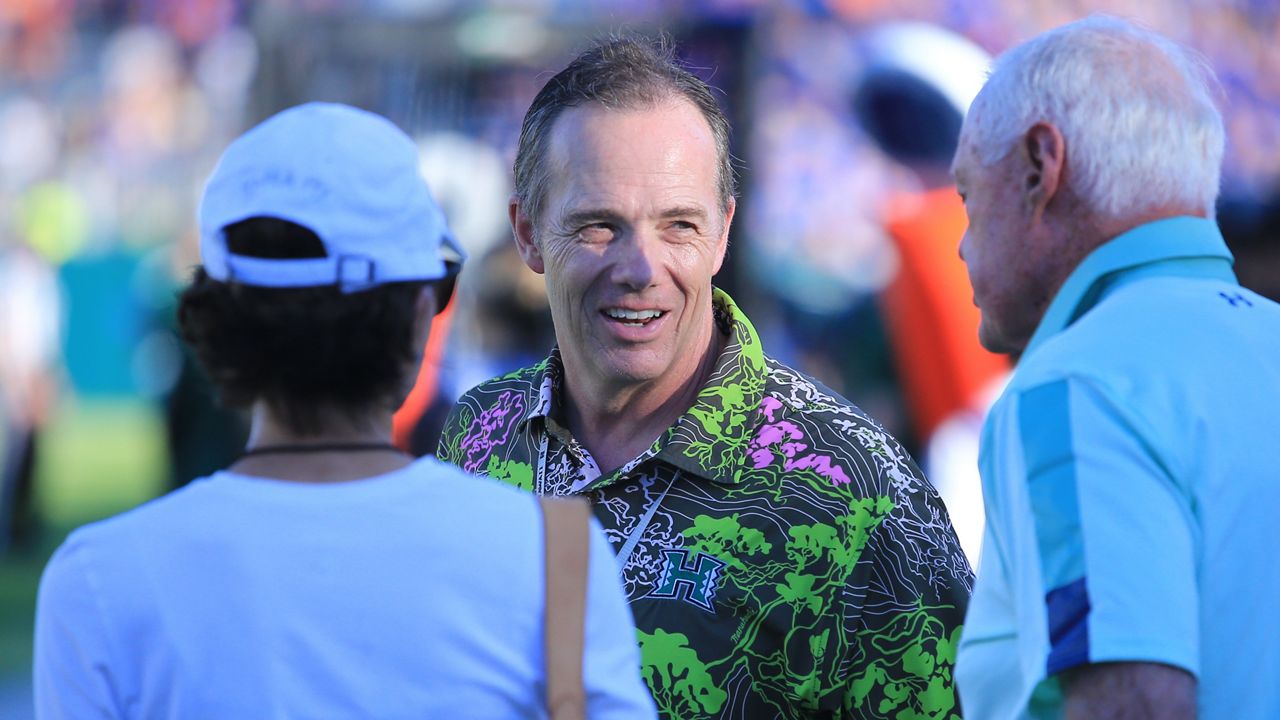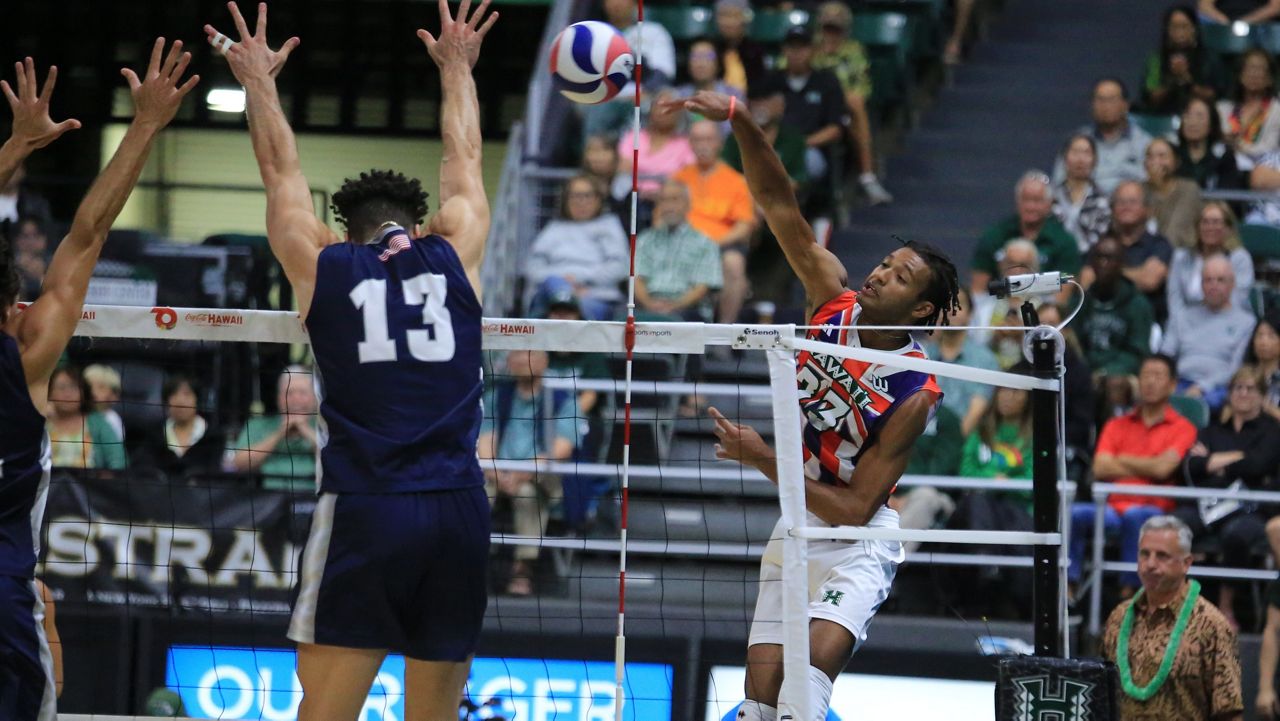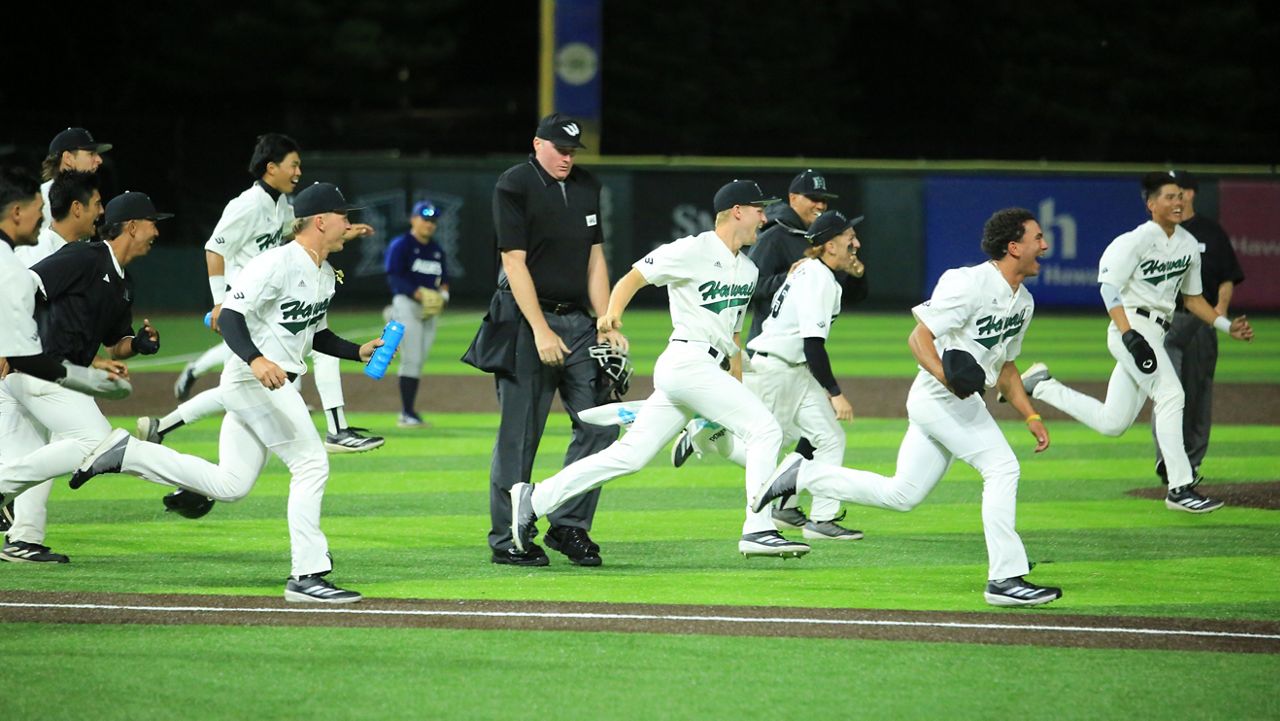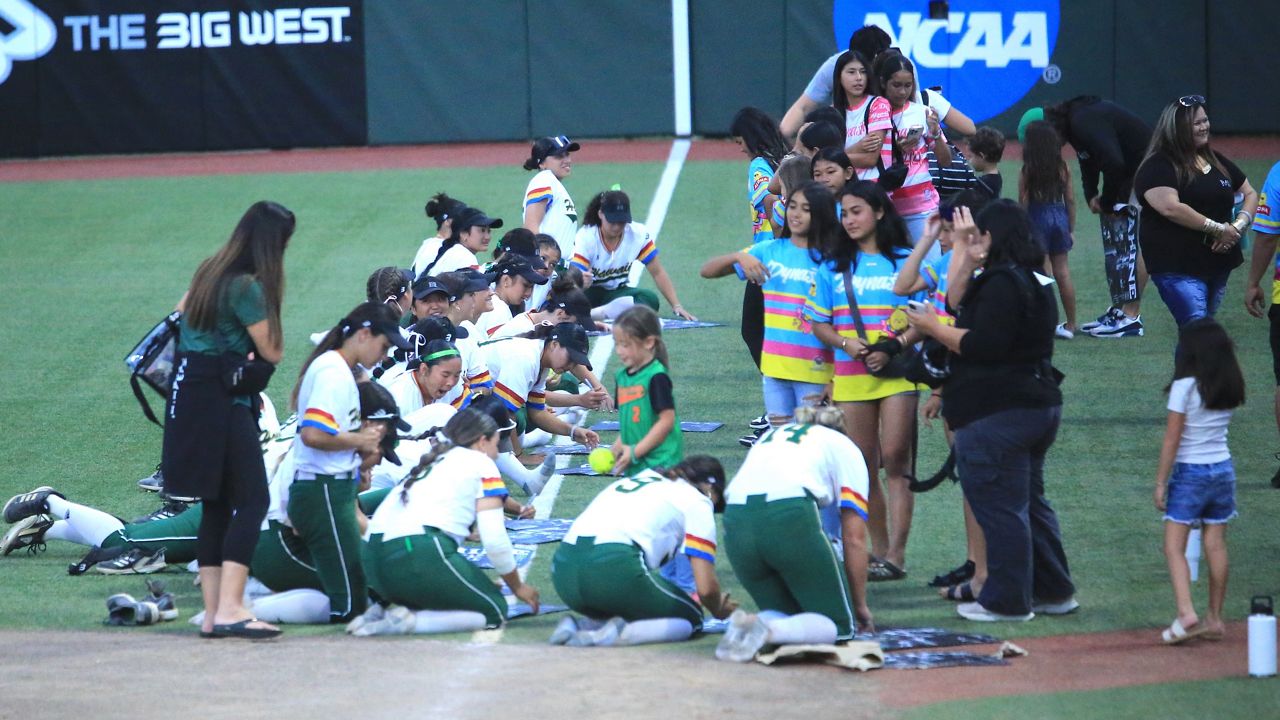HONOLULU — The University of Hawaii decided to leave the Big West Conference to become a full member of the Mountain West starting on July 1, 2026, unifying its football program with most of its non-football sports, Athletic Director Craig Angelos told Spectrum News on Monday night, confirming earlier reports.
UH, which was in talks with the Mountain West over the last two weeks, secured a concession from the MWC to eliminate travel subsidies it currently pays to visiting MWC football teams. Once the move is made, it will also avoid paying the subsidies it gives to Big West schools now for sports like men’s and women’s basketball, women’s volleyball, baseball and softball.
[Note: See below for the full Spectrum News Q&A with UH AD Craig Angelos on the change of conferences.]
The elimination of travel subsidies is significant for the cash-strapped 20-team Manoa athletic department. In the fiscal year 2018, UH listed $1.8 million in total travel subsidies and guarantees. In the same period, UH's own travel costs were $1.5 million.
Angelos said that the move did not have to do with dissatisfaction with the Big West, but rather a move to solidify UH’s position around its FBS football program during a time of dramatic change and rapid conference realignment.
UH and the Mountain West officially announced the news on social media on Tuesday morning.
MWC Commissioner Gloria Nevarez said in a statement, "We are thrilled to welcome the University of Hawaii to the Mountain West as a full-time member. Hawaii has been a tremendous football-only member since 2012, and we’re excited to add their incredible national brand across all MW sports. As the flagship institution on the islands, with extraordinary academics and a celebrated athletics tradition, we look forward to providing their student-athletes with exceptional educational and athletic experiences.”
When UH left the Western Athletic Conference in a desperate position following the 2011-12 athletic year, it agreed to pay travel subsidies to join the Mountain West as a football-only affiliate and the Big West in most of its other sports.
But in recent days, leverage shifted in UH’s favor. Manoa was in position to help the MWC, which will lose five schools to the Pac-12 starting in 2026, complete the NCAA requirement of eight full members for a FBS conference.
It builds on a Sept. 26 pledge that UH, along with the six remaining full members of the MWC, made to stay in the league in football through 2032.
The other full members of the MWC are Air Force, UNLV, Nevada, San Jose State, New Mexico and Wyoming. UTEP has agreed to leave Conference USA for the Mountain West in 2026.
It is to be determined what happens to four UH sports the Mountain West does not sponsor: men’s volleyball, women’s water polo, beach volleyball and men’s swimming and diving. If UH cannot remain in the Big West as an affiliate member in those sports at a cost of $25,000 per sport per year, it will look to place them in the Mountain Pacific Sports Federation, Angelos said.
The Big West issued a statement after UH's official announcement: "Hawaii has a proud history in the Big West that includes 36 conference titles and three national championships, and we look forward to having the Rainbow Warriors and Rainbow Wahine compete for Big West titles in all sports over the next two seasons.
"Discussions regarding Hawaii's possible affiliate membership in men's volleyball, beach volleyball, women's water polo and men's swimming and diving will begin today, and we will have further comment on that subject at the appropriate time."
The Mountain West will cover the $750,000 exit fee from the Big West, Angelos said.
UH held a press conference Tuesday morning, led by Angelos and featuring UH head coaches including women's soccer's Michele Nagamine, men's basketball's Eran Ganot and softball's Bob Coolen.
The following is Spectrum News’ Q&A with Angelos on Hawaii's change of conferences. Note: It has been edited for clarity.
Q: Is the move final?
A: The president (David Lassner) signed the document and returned it to the conference.
Q: What happens to the sports the Mountain West does not sponsor?
A: The four of them — men's volleyball, beach volleyball, women's water polo and men's swimming and diving — will hopefully be able to remain in the Big West Conference. But that is a decision that has to be made by the board of the Big West Conference. If they elect not to allow us to stay, then we would try to get all those four in the MPSF.
Q: It sounds like you are hopeful they will be allowed to remain as an affiliate?
A: Yes, we’re very hopeful that would be the case. I mean, we love the Big West Conference. This move had nothing to do with the Big West Conference. It was just something we needed to shore up, because we’re an FBS football program. We have a great relationship with Big West. We’re hoping that they will want our other four teams to stay in there.
Q: What do you see as the main advantages of aligning your sports?
A: The biggest thing is it creates stability for our program going forward, especially in these changing times of college athletics. I think it provides stability for us, allows us to grow as an athletic department in one conference. Certainly it brings additional revenue for us, on an annual basis, being a full member of the Mountain West Conference. From the competitive standpoint, I think we can be very competitive in that conference. I think it will enhance our men's basketball program and allow for some additional bids into the NCAA Men's Basketball Tournament, a little bit of an elevation probably for us. So that'll be a tougher climb there. I think a lot of other sports, though, could come in and do very well quickly.
Another piece, the media contract, they'll go back out for bids and negotiate with that. That'll bring in some additional money for us also.
Q: Was the 5% share UH was to receive from the Mountain West’s future payout of Pac-12 exit and poaching fees negotiable to something closer to what other schools will get now that you will be a full member?
A: That one-time bonus will stay the same, but going forward, everything will be shared equally. And I think that's important to know, because in the past, the Mountain West has probably had some carve outs for the teams that have done very well, like Boise State, for example.
Q: Travel subsidies are going away in full?
A: Certainly they'll go away on the Big West side, and on the Mountain West side, they're going away also. So that's a big win for us to finally get out from underneath paying travel subsidies for our conference competition to come out play us.
Q: In the discussions over the last week or two with the Mountain West, did the subsidies feature prominently?
A: That was a big piece of it, because you want to improve your status if you're going to move into another conference. I mean, that's the whole reason people have ran through conference realignment, is to improve their current status, and so we're no different.
Q: Did you have a chance to talk to Big West Commissioner Dan Butterly throughout this process?
A: They really want the University of Hawaii in their conference. They’ve been a really good (partner) for us, and treated us very well. He (Butterly) has been very intentional from the very beginning that he wants us to stay in the conference and we've kept him up to date on all this, that with being an FBS football program, it's kind of bigger than that right now. But it had nothing, nothing to do with our dissatisfaction at all, because we love the Big West.
Q: If UH is allowed to remain as an affiliate member in the aforementioned four sports, would you have to pay travel subsidies to the Big West in those?
A: That's a very good question. It’s a little early to know that right now.
Q: Were you and President Lassner aligned on this move?
A: We've been aligned with this from the very beginning. Certainly, we wanted to look at all of our options when this all came about. When the Pac-12 separated and it was just the two of them (Oregon State and Washington State) over there, (Lassner) and I and all of us, felt that there would be some type of merger into a 14-team conference. But we knew there were a lot of variations that could occur, and, and they did occur, and so we tried to position Hawaii in the best possible place. And I think this is the best possible place for us right now.
Q: There’s some speculation that the Mountain West will try to add at least one more member in football. Are you for that?
A: Yeah. I mean, from a scheduling standpoint, you want to have at least eight conference games, and if you only have eight teams, then you either have seven conference games, or you play someone twice in a season. If you have nine or more, then, of course, you can build a schedule.
Q: During these discussions, did the Big West offer to zero out your travel subsidies in order to stay a full member in non-football sports?
A: They did consider it, and we did have a number of discussions about it. It came down at the very end. The question was, if that's what it's going to take for you to stay, we'll take it for a vote with our (Big West) presidents.
But at the end of the day, we did not ask them to take it to a vote, because there became more to the equation.
Note: This story has been updated with an official statement from the Big West and a statement from the Mountain West.
Brian McInnis covers the state’s sports scene for Spectrum News Hawaii. He can be reached at brian.mcinnis@charter.com.











